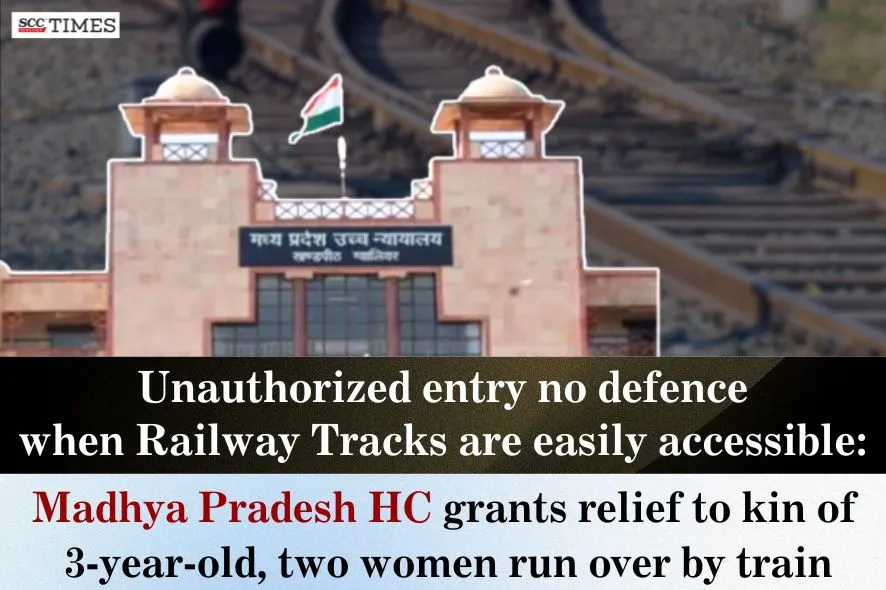Disclaimer: This has been reported after the availability of the order of the Court and not on media reports so as to give an accurate report to our readers.
Madhya Pradesh High Court: In a set of three appeals filed against a judgment passed by Railway Claims Tribunal, Bhopal (“RCT”), whereby claimants were denied compensation for death of three persons when a train ran over them, the Single Judge Bench of Himanshu Joshi J., allowed the appeals, holding that unauthorized entry on railway tracks did not automatically absolve the Railway of liability. Since, the Railway had failed to prove that they took each and every preventive measure to restrict the persons from crossing the railway lines, the failure to take such preventive measures amounted to negligence or breach of statutory duty.
Background
On 16-04-2011, a group of 8 to10 persons went to Maihar for a ceremony. While returning, they boarded train no. 51672 (Satna-Itarsi Passenger) which was overcrowded and while the train started moving, three persons fell down from the train and got trapped and ran over by another train, resulting in their instant death. The Railway denied the accident stating that indeed the deceased persons were crossing the railway lines, while they were hit by a train.
After examining the evidence produced, the RCT concluded that the deceased persons were not boarded on a train and claimants failed to prove that the accident was an untoward accident as defined under Section 123(c) of the Railways Act, 1989 (“the Act”), and thus, the Railway was not liable to pay any compensation.
Aggrieved, the claimants filed the present appeals.
Analysis
Upon perusal of the record, the Court stated that although Railway had satisfactorily proved that the deceased persons were not boarded on Train No. 51672 as the same did not pass through the Maihar Railway Station on the date of accident, it was undisputed that the deceased persons died by run over by Train No. 19051 while crossing the railway lines.
The Court opined that even if the deceased persons were crossing the railway tracks unauthorizedly to reach to other platform, the claim for compensation under Section 124-A of the Act might still be maintainable, if it was established that the deaths occurred due to an “untoward incident” and that the railway administration failed in its statutory duty to ensure safety by preventing unauthorized access to the tracks.
“Contributory negligence or unauthorized entry alone does not automatically absolve the railway administration of liability, unless the case falls within the exceptions provided, i.e., suicide, self-inflicted injury, own criminal act, intoxication, or natural cause.”
The Court noted that the Loco Pilot for the second train stated that while passing through Maihar Railway Station, one of the deceased persons, a 3 years old child, came onto the railway tracks and two women followed him to the tracks while saving him, and all of three were run over by the train. The Court stated that this statement was sufficient to presume that the act of deceased persons was not deliberate, albeit, to save the child who had no knowledge about the consequence of crossing tracks, two women also lost their lives.
The Court opined that when passengers cross railway tracks due to lack of adequate preventive measures like fencing, barricades, announcements, or security, then the Railway administration could not escape liability on the ground that the victim crossed unauthorizedly.
Thus, the Court held that the Railway had failed to prove that they had taken each and every preventive measure to restrict the victims from crossing the railway lines. This failure to take such preventive measures amounted to negligence or breach of statutory duty, and supported the finding that the death occurred due to an “untoward incident” under Section 124-A even if the person crossed the railway tracks.
“If crossing [railway tracks] is accessible or easy even for a three years old child, it implies a systemic failure of the Railway to restrict access.”
Accordingly, the Court allowed the appeals, holding that the RCT erred in dismissing the claims of the claimants. The Court also directed the RCT to award compensation to the claimants in accordance with the Rules and guidelines prevailing at the relevant point of time.
[Ramaavatar v. Union of India, 2025 SCC OnLine MP 8176, decided on 10-11-2025]
Advocates who appeared in this case :
For the petitioner: Vinayak Shah
For the respondent: Ashish Agrawal


